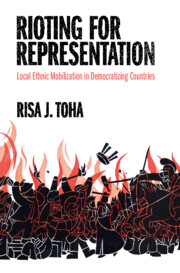35 results
8 - Getting Your Bearings
- from Part II - Essential Signs
-
- Book:
- Chinese Signs
- Published online:
- 29 February 2024
- Print publication:
- 07 March 2024, pp 67-71
-
- Chapter
- Export citation
2 - Who Adjusts to a Supply Shock and Who Resists It
-
- Book:
- Shocking Contrasts
- Published online:
- 09 June 2023
- Print publication:
- 17 August 2023, pp 28-36
-
- Chapter
- Export citation
7 - Channeling Frustration through Exit, Exclusion, and Engagement
-
- Book:
- Africa's Urban Youth
- Published online:
- 10 August 2023
- Print publication:
- 10 August 2023, pp 173-198
-
- Chapter
- Export citation
Exchanges with and without the sword: slavery, politics-as-exchange and freedom in James M. Buchanan's institutional economics
-
- Journal:
- Journal of Institutional Economics / Volume 19 / Issue 6 / December 2023
- Published online by Cambridge University Press:
- 29 June 2023, pp. 787-801
-
- Article
-
- You have access
- Open access
- HTML
- Export citation
3 - Not-for-Profit Organisations and Competition Law
- from Part I - The Object and Purpose of Corporations
-
-
- Book:
- Intersections Between Corporate and Antitrust Law
- Published online:
- 25 May 2023
- Print publication:
- 08 June 2023, pp 48-60
-
- Chapter
-
- You have access
- Open access
- HTML
- Export citation
GROUP RIGHTS, GENDER JUSTICE, AND WOMEN’S SELF-HELP GROUPS: EXIT, VOICE, AND LOYALTY IN AN INDIGENOUS COMMUNITY IN INDIA
-
- Journal:
- Social Philosophy and Policy / Volume 40 / Issue 1 / Summer 2023
- Published online by Cambridge University Press:
- 05 February 2024, pp. 103-128
- Print publication:
- Summer 2023
-
- Article
- Export citation
Epistemic Democracy: Making Pluralism Productive
-
- Article
-
- You have access
- Open access
- HTML
- Export citation
2 - The Profits of Distrust
-
- Book:
- The Profits of Distrust
- Published online:
- 18 August 2022
- Print publication:
- 25 August 2022, pp 35-69
-
- Chapter
- Export citation
3 - (Dis)trust at the Tap
-
- Book:
- The Profits of Distrust
- Published online:
- 18 August 2022
- Print publication:
- 25 August 2022, pp 70-99
-
- Chapter
- Export citation
5 - Speaking Up or Opting Out
-
- Book:
- The Profits of Distrust
- Published online:
- 18 August 2022
- Print publication:
- 25 August 2022, pp 125-145
-
- Chapter
- Export citation
6 - Divesting for Development
-
- Book:
- Investment Law's Alibis
- Published online:
- 21 July 2022
- Print publication:
- 04 August 2022, pp 153-170
-
- Chapter
- Export citation
1 - Diaspora Activism and the Dynamics of Voice
-
- Book:
- The Arab Spring Abroad
- Published online:
- 14 April 2022
- Print publication:
- 21 April 2022, pp 30-43
-
- Chapter
-
- You have access
- Open access
- HTML
- Export citation
Chapter 13 - Ex-Utero Intrapartum Therapy
- from Section 3
-
-
- Book:
- Anesthesia for Maternal-Fetal Surgery
- Published online:
- 19 November 2021
- Print publication:
- 11 November 2021, pp 191-206
-
- Chapter
- Export citation
Chapter 4 - Multidisciplinary Approach to Fetal Surgery
- from Section 1
-
-
- Book:
- Anesthesia for Maternal-Fetal Surgery
- Published online:
- 19 November 2021
- Print publication:
- 11 November 2021, pp 45-63
-
- Chapter
- Export citation
8 - Conclusion
-
- Book:
- Rioting for Representation
- Published online:
- 28 October 2021
- Print publication:
- 04 November 2021, pp 230-250
-
- Chapter
- Export citation
7 - How Riots Dissipated
-
- Book:
- Rioting for Representation
- Published online:
- 28 October 2021
- Print publication:
- 04 November 2021, pp 199-229
-
- Chapter
- Export citation

Rioting for Representation
- Local Ethnic Mobilization in Democratizing Countries
-
- Published online:
- 28 October 2021
- Print publication:
- 04 November 2021
Dynamics of farm entry and exit in Canada
-
- Journal:
- Agricultural and Resource Economics Review / Volume 51 / Issue 1 / April 2022
- Published online by Cambridge University Press:
- 25 October 2021, pp. 86-104
-
- Article
-
- You have access
- Open access
- HTML
- Export citation
1 - Diaspora Activism and the Dynamics of Voice
-
- Book:
- The Arab Spring Abroad
- Published online:
- 18 October 2021
- Print publication:
- 30 September 2021, pp 30-43
-
- Chapter
- Export citation
The historical dynamics of US financial exchanges
-
- Journal:
- Financial History Review / Volume 28 / Issue 2 / August 2021
- Published online by Cambridge University Press:
- 14 July 2021, pp. 153-174
-
- Article
- Export citation



